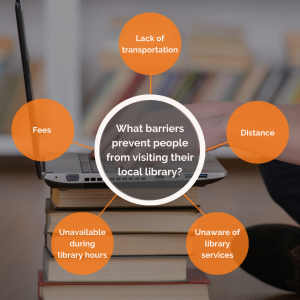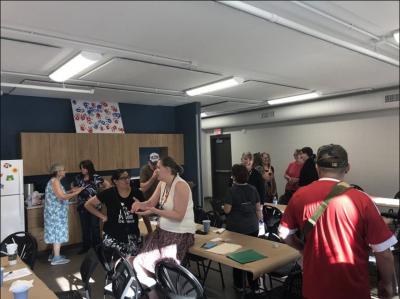
Libraries Without Borders US
It's an urgent matter. The need to read. Make a donation!
Access: from obstacles to resources as seen in rural Minnesota
Education and literacy are contingent on a salient and crucial factor: access. Access can take on a variety of different forms. It can refer to the basic need for internet and connectivity in order to surf the internet, read news articles, and correspond with long-distance friends and family. It can also refer to the ease with which one is able to reap the benefits of the library’s community resources. Prior to 2020, millions of Americans could not take advantage of these resources for various reasons, including hectic work schedules and the distance many had to travel to visit their local library. In the COVID-19 era, access has been limited even further due to newfound sanitary measures and the in-person closure of many schools and libraries. Pandemic or not, the overarching obstacle of access persists, especially in rural communities, where libraries and learning hubs are sparse. In rural Minnesota, Libraries Without Borders US (LWB US), the Blandin Foundation, and local partners take this discrepancy in access head-on by bringing digital literacy labs and pop-up libraries directly to hard to reach, rural communities.

The Blandin Foundation is committed to strengthening rural Minnesota communities by training, supporting, and connecting leaders and investing in digital inclusion. Together, LWB US and the Blandin Foundation are working to guarantee all Minnesotans, from Worthington to the Blandin Foundation’s base in Itasca County, have access to critical resources. Fundamental to our work is human-centered design, or involving the community at every stage of our process. As such, we collaborate extensively and directly with local and grassroots community organizations.
When asked what first interested organizations to partner with LWB US and the Blandin Foundation, Katherine Craun, board member and past president of the Nobles County Library in Worthington, MN, and member of the local Friends of the Library, highlights the importance of adapting a program’s focus to match community needs,
“The concept of Libraries Without Borders is one I believe could meet the needs of our immigrant population. Although a small town, 11,000, in a rural area, the issue of access is of concern. I have been a part of a past Blandin Foundation Leadership group and Worthington has hosted at least four such efforts in the past. Each addressed a different community focus - education, health, leadership, economic development.”
When asked the same question, Andrea Duarte-Alonso, Lead for America Hometown Fellow at the Southwest Initiative Foundation, highlights the importance of dynamic, innovative responses to ever-changing needs, a pillar integral to LWB US’ work in meeting people where they are,
“The [Southwest Initiative Foundation’s] interest came from wanting a creative and innovative idea that would support community members through resources that are often not accessible to them. This support also encourages closing the technological and educational gap for families. It provides literacy to families without transportation or other needed amenities to access books and technology.”
Access to library and digital resources inspired both Duarte-Alonso and Craun to get involved in rural broadband expansion. Illustrating the need for this access, Duarte-Alonso of the Southwest Initiative Foundation recounts the challenges many rural communities face(d), in both pre- and post-pandemic life,
“Rural broadband expansion has long been a need in small -towns and rural communities, but once the pandemic hit it became even more evident that families lacked access to technology and internet access. There are barriers such as not being able to afford the internet or technology that may be needed for students.”
Craun of the Nobles County Library recounts a similar observation, highlighting that,
“Access to technology is an ongoing issue in our community. Not only do citizens in Worthington have limited ability to connect to resources' networks, but also those in rural areas.”
So how can rural communities be connected to critical resources, considering obstacles that span from a lack of connectivity to finding a way to get to a local library? Our answer: by bringing library resources directly to these communities. LWB US, the Blandin Foundation, and local partners have teamed up to design and implement digital literacy labs and pop-up libraries, equipped with digital resources and programming ranging from monthly story time and ESL classes to workforce training and digital literacy workshops.
The Nobles County Library and the Southwest Initiative Foundation are optimistic about the trajectory of these pop-up library hubs. When asked how working with LWB US and the Blandin Foundation to design these pop-up hubs would respond to the aforementioned needs seen firsthand in the community, Craun of the Nobles County Library explains,
“Access, Access Access. All citizens need to be connected and involved in community activities. First individuals and families need the hardware and software to connect. Second, they need a location to connect. Pop-ups would be a great way to meet needs of isolated housing units, small towns/villages, and rural farms.”
Duarte-Alonso of the Southwest Initiative expands by sharing,
“Working with LWB US and the Blandin Foundation is a great partnership because they already come with experience of working with other communities that have had a similar need. Working together will help have a deeper understanding of how the labs and pop-up libraries will work with the community I live and work in.”
Building on what we have learned throughout the ConnectED Tech Kit program, LWB US will continue to design and adapt our programs in response to community voices, and ensure that those voices guide the flow of resources for a more equitable society.
Looking ahead, LWB US will implement these learning hubs across rural Minnesota, innovating how communities and local libraries interact with each other. In the words of Hannah Buckland, State Library Program Specialist at MN State Library Services, “[working with LWB US and the Blandin Foundation to design digital literacy labs and pop-up libraries] demonstrates the evolution of public library services beyond their physical walls.” Given the necessity of digital access and the importance of literacy in today’s world, this project aims to create a model for meaningful community engagement by centering libraries as a linchpin connecting residents to critical services.
Our work in rural Minnesota is only possible thanks to the support of our partners and supporters, including the Blandin Foundation, Nobles County Library, the Southwest Initiative Foundation, the Itasca Economic Development Corporation, Kootasca Community Action, and MN Department of Education, MN State Library Services.
